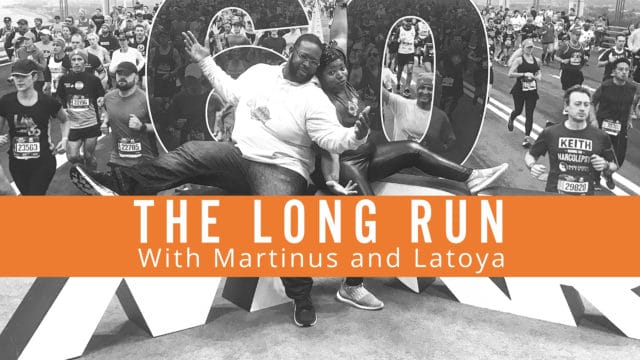It’s that time of year: before you know it, the old year is gone and the new one has come roaring in. There are so many of us who make resolutions to live healthier lives every year – and if you’re really ambitious, you might have even made a New Year’s resolution to run a marathon or a half marathon this time around. You’re probably getting excited at the thought of such a new challenge. At the same time you’re probably getting nervous, especially since you might not know where to start. Well, have no fear, goal crushers: Martinus is here! If you’re seriously considering running a 13.1 or a 26.2 here are nine questions to ask yourself before you sign up for that big race.
Question #1: Am I Healthy and/or Injury Free?
It goes without saying that this should always be the first and most important question you ask yourself before strapping on those running shoes. You need to be brutally honest with yourself: are you healthy enough to put yourself to the rigorous training of a half or a full marathon? If you got some nagging injuries you’re still recovering from, you may want to reconsider training for a half or full marathon because you don’t want to risk injuring yourself even worse.
Question #2: What Kind of Shape Are You In Right Now?
Are you in the right physical shape to jump into a 16 or 20-week training plan? Do you need to build up your mileage first? Most training programs start with a 4 to 6 mile run, though others can start as high as an 8 to 10 mile run on the very first day. Consider how many miles are you comfortable running now or how long it would take you to build up your endurance. This plays a major role in determining the training plan that is best for you and how long you need to train to be ready for your big race.
Question #3: Do You Have the Time?
Training for a marathon or half marathon takes a lot of time. This isn’t just a hobby – it’s a second full-time job! And it’s not just the physical act of running that’s so time-consuming, either. Other aspects of training, like staying hydrated, fueling up, stretching, and getting plenty of sleep, especially on the nights before and after your long run, all make big demands on your time. You need to seriously ask yourself if you have the time to jump headfirst into such a demanding training schedule.
Question #4: What’s Your Goal for This Race?
It’s time to figure out your end goal for this race. Do you want to run the whole way without stopping? Do you want to hit a personal record? Do you want to qualify for the Boston Marathon? Keep your answers in mind, as they will help you plan the rest of your training strategy.
Question #5: What Race Will You Run?
This is probably the most important question you’ll need to answer. When considering a race to run, check to see what the course time limit is and ask yourself if you can finish the race in the allotted time. If the answer is no, you may want to think about choosing one that has a longer time limit. For slower runners, I got your back: I’ve gathered a list of races dedicated for those of us who aren’t ready to finish the Boston Marathon in two hours.
Something else to look into is the terrain of the race. Is it hilly? Is it flat? Consider these questions when you’re training. You don’t want to run a hilly course when you’ve been training exclusively on flat land for weeks. Next, you’d better take into account what the weather conditions are going to be. If you’re picking a race in the middle summer when it’s 100°F in the shade, you’re not going to prepare the same way you would for a race in the dead of winter. I ran my first half marathon on the hottest day of summer and trust me when I say it wasn’t pleasant. It got so hot that they had the fire department come spray us with water while we were running.
Another thing to consider: how far away do you live from the race? Are you traveling to the location or are you staying local? How much is a hotel or motel room going to cost you? For races that require runners to raise money for charity, are you okay with approaching your friends and family to make a donation? Fun fact: $5000 is the minimum charitable amount you need to raise to take part in the Boston Marathon. However, most charities will not pick you to run unless you’re willing to commit to raise more than that.
Other things to consider: What do reviewers say about the race? How experienced are the organizers and how long has the race been around? These questions get at your overall race experience. Races that are more established typically operate like well-oiled machines compared to newer races, but that’s not to say you won’t enjoy yourself at a race that hasn’t been around as long.
Question #6: What Training Plan Will You Use?
This is also a huge decision. You should not choose the first training plan that you find on Google, Pintrest, Facebook, or anywhere else you find on the Internet. This is where the previous questions come into play. You need to keep your goals in mind, the amount of time you have to devote to training, and your current fitness level to choose a plan that will work for you. When I trained for my first marathon and half marathon, I used the Runners World Smart Coach app to get me to the finish line. I like the app because it takes your last race time, the date of the race you’re planning to run, and makes a training plan based off those parameters.
Question# 7: What Day Will You Decide to Do Your LSDs?
No, I’m not talking about Timothy Leary’s favorite party drug. LSDs are long slow distance runs, and they play a crucial role in conditioning yourself for running a marathon or half marathon. If you work a typical Monday through Friday 9 to 5 job, going for LSD runs on Saturday or Sunday are the obvious choices. However, this decision has an impact on your whole weekend, especially as you get closer to your race date. You might as well consider one of these days – if not both – a complete wash. Remember when I said training for a marathon or a half marathon is like a second job? When I was training for my first marathon I would be out of the house about six or seven hours a day.
Question #8: What Will Be Your Dedicated Recovery Day?
As dedicated as you might be, your body needs time to recover periodically from all that training. Pick at least one day where you can put your feet up in recovery while you refuel your body as well as your mind. Consider choosing the day after your LSD run for your dedicated recovery day; trust me, you’re going to need it.
Question #9: How Will You Cross Train?
This falls under the “second job” category, too: on the days that you’re not running you should be cross training. Plan out your cross training days in advance. Are you going to do yoga, bike, swim, or attend a group fitness class? Either way, make sure you have some element of strength and flexibility training in your repertoire.
There you have it, goal crushers. Nine questions you should ask yourself before signing up for your next marathon or half marathon. Am I missing anything? If you think there’s a question that should be added to this list, or if you see something that stands out the most to you, leave a comment below.
Until next time, keep crushing those goals!


